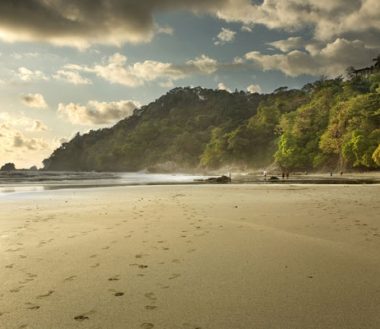Your Updated Costa Rica Travel Health Guide
 Costa Rica may be generally regarded as a second-world country, yet its brilliant public health system and the government’s commitment to maintaining a pristine environment means that this is actually one of the healthiest tropical countries you could visit.
Costa Rica may be generally regarded as a second-world country, yet its brilliant public health system and the government’s commitment to maintaining a pristine environment means that this is actually one of the healthiest tropical countries you could visit.
Of course, you’ll still be exposed to diseases which simply don’t exist in your country and this, along with a change in cuisine and climate, can still cause you some grief during your visit.
Want to avoid any health-related issues during your trip to Costa Rica?
Then follow our tips to keeping happy and healthy during your vacation to this most incredibly beautiful country.
Use Only Bottled Water
 Recent droughts caused by El Nino have had detrimental effects on the country’s water supplies, concentrating unhealthy levels of bacteria. Although water quality in the greater part of Costa Rica has always been excellent, with bottled water only recommended in rural or remote areas, the current recommendations are for tourists to drink bottled water, which is both widely available and inexpensive.
Recent droughts caused by El Nino have had detrimental effects on the country’s water supplies, concentrating unhealthy levels of bacteria. Although water quality in the greater part of Costa Rica has always been excellent, with bottled water only recommended in rural or remote areas, the current recommendations are for tourists to drink bottled water, which is both widely available and inexpensive.
Naturally, you need not worry about water safety when staying in upmarket resorts or dining in upmarket restaurants. In these places, water is treated and perfectly safe. If in doubt use only bottled water and do ask locally about the safety of tap water in each region you travel to.
Expect Stomach Upsets
 Even the most ardently conscientious traveler can experience the odd stomach upset when visiting Costa Rica, but this has nothing to do with unhealthy food or water. It is a simple reaction to a change in environment, climate, and cuisine. Usually, sticking to plain food (boiled rice with cooked vegetables) for a day or two is enough to set things right.
Even the most ardently conscientious traveler can experience the odd stomach upset when visiting Costa Rica, but this has nothing to do with unhealthy food or water. It is a simple reaction to a change in environment, climate, and cuisine. Usually, sticking to plain food (boiled rice with cooked vegetables) for a day or two is enough to set things right.
It’s wise to pack some re-hydration sachets to add to your bottled water, as stomach upsets will usually render you dehydrated. When eating from street food stalls, make sure your food is freshly prepared and is either piping hot or refrigerated. Buy only fruits you can peel and, above all else, make sure you are strict about your own hygiene. Washing your hands when handling food is actually the most effective way of preventing stomach upsets.
Sunstroke…the Quiet Enemy
 Costa Rica is renowned as a sunny haven, yet the heat and humidity can certainly have detrimental effects on you, especially if you’re traveling here to escape winter at home. Wear a hat, slap on the sunscreen and make sure you drink at least 3-4 liters of water a day. These are all essential tips to preventing sunstroke and dehydration, which can cause a bevy of symptoms from fever to headaches, tiredness and stomach upsets. Limit your exposure to the strong tropical sun in Costa Rica, most especially in the first few days of your vacation.
Costa Rica is renowned as a sunny haven, yet the heat and humidity can certainly have detrimental effects on you, especially if you’re traveling here to escape winter at home. Wear a hat, slap on the sunscreen and make sure you drink at least 3-4 liters of water a day. These are all essential tips to preventing sunstroke and dehydration, which can cause a bevy of symptoms from fever to headaches, tiredness and stomach upsets. Limit your exposure to the strong tropical sun in Costa Rica, most especially in the first few days of your vacation.
Watch out for Mosquitoes!
 Many visitors to Costa Rica fear being bitten by spiders or snakes, when in fact the major health danger posed here is by mosquitoes. The risk of catching mosquito-borne diseases like malaria or dengue fever may be minimal, but it helps to be weary of all mosquito bites, most especially in affected areas like Liberia, Puntarenas, and Limon.
Many visitors to Costa Rica fear being bitten by spiders or snakes, when in fact the major health danger posed here is by mosquitoes. The risk of catching mosquito-borne diseases like malaria or dengue fever may be minimal, but it helps to be weary of all mosquito bites, most especially in affected areas like Liberia, Puntarenas, and Limon.
Use repellent and wear long trousers and long-sleeved tops when hiking through forests and jungles. There are plenty of organic repellents which are both effective, gentle on the skin and environmentally friendly. Make sure your accommodation provides mosquito nets on beds and do consider bringing mosquito coils, which are cheap but very effective.
Whether or not you choose to take prophylaxis is something you’ll need to discuss with your doctor. Many of these preventative medications carry some pretty serious side effects – stomach problems and photosensitivity being among the most common – so you’ll need to decide for yourself whether the minimal risk is worth the possible implications. Worried about the latest outbreak of the Zika virus? Read our comprehensive Zika guide before traveling and learn why this threat is not nearly as dangerous as it’s been made out to be!
Trust the Local Health Care
Costa Rica is fast becoming a revered medical tourism destination, whereby North Americans and Europeans choose to travel here specifically for elective surgery. The quality of care is world-class but only costs a fraction of the price. Should you fall ill, ask you hotel or resort concierge to recommend a local doctor and hospital, and do note that Costa Rica has an extensive Tourism Medical Care Service with emergency paramedic assistance to all corners of the country. It is advisable to take out extra travel health insurance for your peace of mind.
Check-up at Home
It may be rare that you bring home an unexpected hitchhiker from your Costa Rica vacation, but it has been known to happen. Should you feel unwell at any time after returning home, do visit your local physician and request a full blood, urine, and stool test, to check for parasites which may have entered your system. Usually, they are easily treated with over-the-counter medication and are nothing to worry about.
Inoculations and Preventative Medication
 At time of writing, there are no inoculations required to visit Costa Rica, yet whether or not you choose to take vaccines or boosters is something you’ll need to discuss with your doctor prior to visiting.
At time of writing, there are no inoculations required to visit Costa Rica, yet whether or not you choose to take vaccines or boosters is something you’ll need to discuss with your doctor prior to visiting.
Don’t let a fear of illness and malaise stop you from visiting one of the world’s most incredible holiday destinations. With only a few precautions you can ensure your trip to Costa Rica be a most unforgettable and rewarding adventure.









